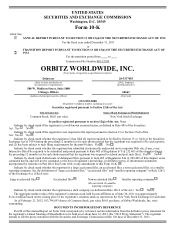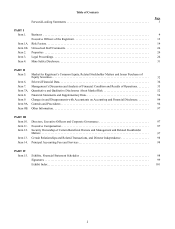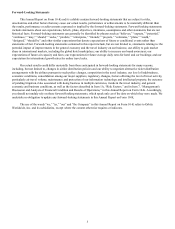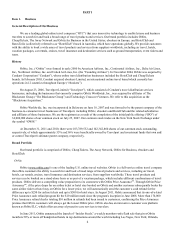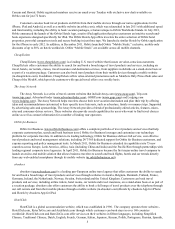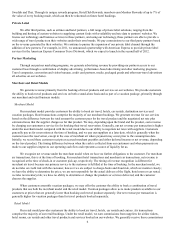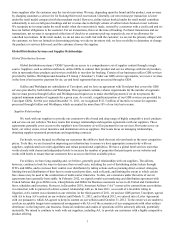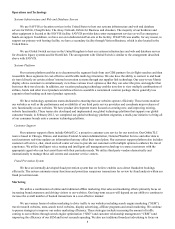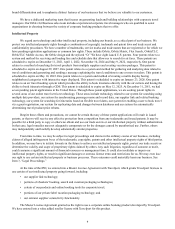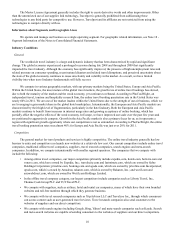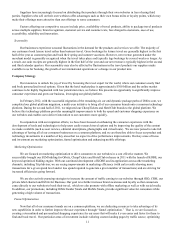Orbitz 2011 Annual Report Download - page 10
Download and view the complete annual report
Please find page 10 of the 2011 Orbitz annual report below. You can navigate through the pages in the report by either clicking on the pages listed below, or by using the keyword search tool below to find specific information within the annual report.10
The Master License Agreement generally includes the right to create derivative works and other improvements. Other
than the unrestricted use of our supplier link technology, Travelport is generally prohibited from sublicensing these
technologies to any third party for competitive use. However, Travelport and its affiliates are not restricted from using the
technologies to compete directly with us.
Information about Segments and Geographic Areas
We operate and manage our business as a single operating segment. For geographic related information, see Note 18 -
Segment Information of the Notes to Consolidated Financial Statements.
Industry Conditions
General
The worldwide travel industry is a large and dynamic industry that has been characterized by rapid and significant
change. The global economy experienced a prolonged recession during late 2008 and throughout 2009 that significantly
impacted the travel industry. Although the economy has significantly improved, the presence of high unemployment rates and
related pressure on consumer spending, recent natural disasters and related travel disruptions, and perceived uncertainty about
the state of the global economy continues to cause uncertainty and volatility in the market. As a result, we have limited
visibility into when travel industry fundamentals will fully recover.
We compete in various geographic markets, with our primary markets being the United States, Europe and Asia Pacific.
Within the United States, the most mature of the global travel markets, the growth rate of online travel bookings has slowed,
due to both the maturity of the market and the weak economy, yet continues to rebound. According to PhoCusWright, an
independent travel, tourism and hospitality research firm, the online travel booking penetration rate in the United States was
nearly 60% in 2011. We are one of the market leaders within the United States due to the strength of our air business, which we
are leveraging to gain market share in the global hotel marketplace. Internationally, the European and Asia Pacific markets are
characterized by their high level of fragmentation, particularly in the hotel industry. Both the European and Asia Pacific
markets continue to benefit from increases in internet usage rates and growing acceptance of online booking, which has
partially offset the negative effects of the weak economy. In Europe, we have improved our scale over the past few years and
are positioned to aggressively compete. Growth in the Asia Pacific market is also a primary focus for us, as it represents a
region with significant growth opportunity where our competition is not as entrenched. According to PhoCusWright, the online
travel booking penetration rates was almost 40% for Europe and Asia Pacific was just over 20% for 2011.
Competition
The general market for travel products and services is highly competitive. The online travel industry generally has low
barriers to entry and competitors can launch new websites at a relatively low cost. Our current competitors include online travel
companies, traditional offline travel companies, suppliers, travel research companies, search engines and meta-search
companies. In addition, we compete internationally with smaller regional operators. The companies that we compete with
include the following:
• Among online travel companies, our major competitors primarily include expedia.com, hotels.com, hotwire.com and
venere.com, which are owned by Expedia, Inc.; travelocity.com and lastminute.com, which are owned by Sabre
Holdings Corporation; priceline.com, booking.com and agoda.com, which are owned by priceline.com Incorporated;
opodo.com, which is owned by Amadeus; rakuten.com, which is owned by Rakuten, Inc.; and wotif.com and
asiawebdirect.com, which are owned by Wotif.com Holdings Limited.
• In the offline travel company category, our largest competitors include companies such as Liberty Travel, Inc.,
Thomas Cook Group PLC and TUI Travel PLC.
• We compete with suppliers, such as airlines, hotel and rental car companies, many of which have their own branded
websites and toll-free numbers through which they generate business.
• We compete with travel research companies such as TripAdvisor LLC and Travelzoo Inc., through which consumers
can access content such as user-generated travel reviews. Travel research companies also send customers to the
websites of suppliers and our direct competitors.
• We compete with search engines including Google, Bing, Yahoo! and meta-search companies such as Kayak. Search
and meta-search websites are capable of sending consumers to the websites of suppliers and our direct competitors.

